The Agony Column for September 12, 2003
Commentary by Terry D'Auray
The mean streets of Seattle as photographed by
prize-winning student journalist Mike Laszlo.
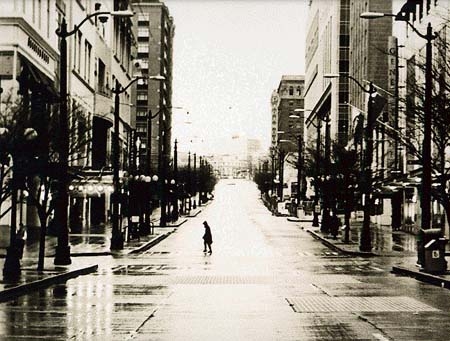
The mean streets of Raymond Chandler have gotten pretty crowded of late, jammed with private investigators all cracking wise, righting wrongs, taking down dealers and bedding beauties in book after book after book. There are literally hundreds of PI series, and the majority motor safely and steadily down the middle of that street, well within the speed limit, passenger's seat belts firmly fastened. Most of these series writers create a character, a setting or a plot twist that's good enough to fuel a few loyal fans and a sufficient number casual readers to keep from stalling - and to keep getting published! But every once in a while, one of these steady drivers gooses the gas pedal and zooms to the front of the pack. When that happens, we as readers should take notice and applaud.
G.M. Ford was one of the better middle-of-the roaders for six years with his Leo Waterman series, beginning with the promising 'Who in Hell is Wanda Fuca" in 1995. The title, a pun on the Straits of Juan de Fuca in Puget Sound north of Seattle, was cursed with one of the ugliest dust jackets in contemporary mystery fiction. Black Raven's Mystery News notes that the Seattle Mystery Bookstore felt compelled to cover 'Wanda' in plain brown wrappers for Ford's first signing. But the book was a charmer, introducing Leo Waterman and "The Boys".
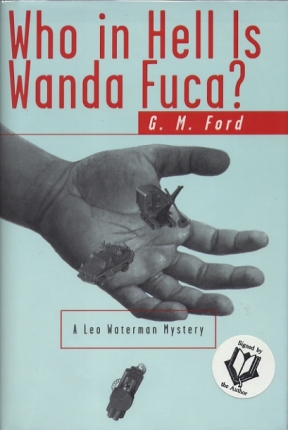 |
|
Terry's collected cover of 'Who in Hell is Wanda Fuca?' |
Leo is the son of Wild Bill Waterman, former Seattle City Councilman in the Richard Daly mode, a mover, shaker, knows-all-the-skeletons kind of guy. Wild Bill's now dead, but his notoriety and influence extend from the grave, giving Leo an investigative edge. Laid back, aging hippie-with-a-trust-fund, Leo's a lightly boiled Seattle P.I., who's aided in his investigations by 'The Boys', a group of homeless, drunken cronies of his father who fill-in as operatives for the price of unlimited booze or an occasional place to sleep indoors. Leo is wholly engaging character, honest and politically incorrect, with an irreverent wit and modern sensibilities. The Seattle setting is finely tuned and amusingly described and the books are generally well plotted, well written and crisply paced, comfortably realistic with a light dash of quirkiness.
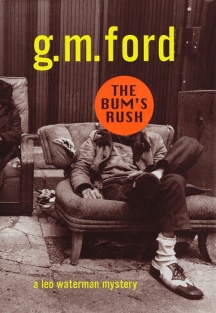 |
|
The third Leo Wasserman Mystery by G. M. Ford. |
But after six books, the Leo Waterman series was getting repetitive and stale, the plots progressively more outrageous, veering into capricious caperdom, and Leo himself, initially an offbeat and amusing character, was suffering from prolonged exposure. Ford was stuck driving down the same stretch of the road again and again, and it showed. Ford wisely opted to come to a complete stop.
|
|
|
|
|
|
|
|
Who in the Hell is Wanda Fuca? |
|
|
|
|
|
|
Cast in Stone |
|
|
|
|
|
|
The Bum's Rush |
|
|
|
|
|
|
Slow Burn |
|
|
|
|
|
|
Last Ditch |
|
|
|
|
|
|
The Deader the Better |
|
|
|
|
|
In 2001, Ford traded his aging Seattle-gray Honda for a racier mean black Harley, opened the throttle and rocked into the fast lane with fellow writers like Lehane, Connelly and Leonard with a new Frank Corso series. Under praised and under-read, the Corso series and Ford's invigorated writing is just now beginning to register on the hardboiled radar gun. Dennis Lehane describes him as "hands down, one of my favorite contemporary crime writers...the best-kept secret in mystery novels."
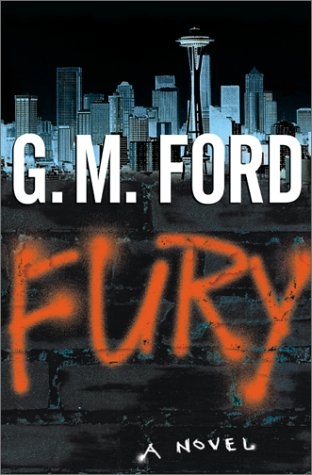 |
|
'Fury' was G. M. Ford's first book of self-re-invention. |
Introduced in 'Fury', Frank Corso is a defrocked New York Times reporter, fired for fabricating facts in a crime story. In a case of art anticipating reality, Ford's Corso preceded Jayson Blair's widely publicized lynching by a couple of years. To write Corso, Ford dialed up the intensity, turned on the heat and turned down the lights.
In 'Fury', Corso has moved to Seattle to avoid the New York limelight, and lives on his house boat in near isolation, surviving on royalties from a best-selling book and writing the occasional column for a local tabloid "Seattle Sun". Leanne Samples, a slow-witted local girl, was nearly victim number nine in a killing spree by Walter Leroy Himes, "The Trashman", a sociopathic serial killer who left his victims ghoulishly displayed in dumpsters around Seattle. Leanne's testimony sent Himes to death row and allowed all of Seattle, from cops to common man, to feel that justice had been done and evil punished. Six days before Himes is to be executed, Leanne wants to recant her testimony - but only to Frank Corso and the "Seattle Sun". Indebted to the tabloid publisher, Frank agrees to dig for the truth, and is paired in this quest with local photojournalist Meg Dougherty.
Ford initially wrote 'Fury' as a stand-alone book, not as the first of a planned series, and it works perfectly well on its own. Frank Corso is introduced as an ethically tarnished and enigmatic protagonist and Meg Dougherty is more a love-interest than sidekick. And with Corso as leading man, rather than light-weight Leo, Ford was free to explore grittier, bleaker territory. The themes in 'Fury' are complex and morally challenging - should a morally repugnant criminal be put to death, even if innocent of some of the crimes with which he's charged. And should that be done with the full support of the law? With the success of 'Fury' Ford was encouraged to turn a solo into a series, and wisely left himself an inviting cast of characters and contemporary landscape with which to work.
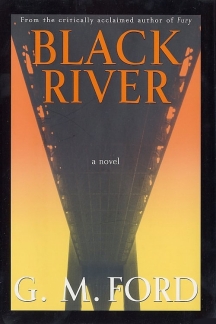 |
|
Frank Corso investigates crime and corruption in 'Black River'. |
In 'Black River', Corso is the sole reporter allowed into the closed retrial of notorious crime boss Nicholas Balagula. Accused of over sixty deaths, Balagula attempts to insure a not guilty verdict with jury tampering, bribery and his own ruthlessly effective "witness removal" plan. Meg Dougherty, pursuing her own investigation of an apparently separate incident, barely survives an attempt on her life and lies comatose in a Seattle hospital. Corso goes it alone to investigate both Balagula's corruption and the reasons behind the attempted murder of Dougherty.
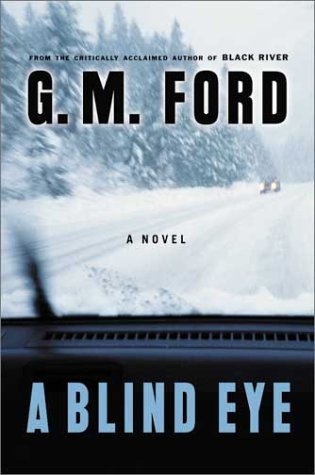 |
|
'A Blind Eye' is the latest release from G. M. Ford. |
In 'A Blind Eye', Corso and Dougherty are trapped in a Midwest snowstorm. Corso's ducking extradition to Texas to present evidence he doesn't have to a Texan grand jury. Meg is taking pictures for his next book. Forced by the blinding blizzard to seek shelter in an all-but-abandoned Wisconsin cabin, they discover a true house of horror and, midst running, hiding, digging and danger, unravel the secret trail of a truly diabolical female serial killer.
Frank Corso is one of the few series protagonists with almost no back-story. He is a mystery - remote and inaccessible. Eschewing the typical tactic of letting the hero's past (be he scared by Vietnam, plagued by the violent loss of wife or child, or remorseful over taking an innocent life) drive his motivation and define his character, Ford gives Corso sparse history. What you know about him, and come to respect, stems solely from his acts and expositions in each narrative. Even more unusual is the fact that three books later, we still know little about Corso's past. Ford is meting out details sparingly and it adds a layer of intrigue that compels further exploration. Ford has yet to tell Corso's side of the New York Time's defrocking story, although the reader suspects there's a complex and vindicating explanation, maybe worth a book in itself.
From his actions and attitudes, we do know that Corso is not a nice guy in a rich, slick package. He refuses to play by the rules and he's often a churlish bully. He is tenacious, committed to justice, but disdainful of those in a position to dispense it, and is often downright dangerous. He is an unabashed wise-cracker, with a quick wit and appealing in-your-face attitude. And he is also uniquely sad. Corso is intense, dark, gritty and tough, ready to stand next to Connolly's "Bird" Parker, Lehane's Patrick Kenzie or Block's Matt Scudder and carry a long-running mystery series.
|
|
|
|
|
|
|
|
Fury |
|
|
|
|
|
|
Black River |
|
|
|
|
|
|
A Blind Eye |
|
|
|
|
|
Meg Dougherty is one of the most strongly written sidekicks in contemporary mystery fiction. Ford has divulged far more about Meg and her history than he has of Frank. Beginning as a reluctant tag-along and rapidly developing into love-interest in 'Fury', Ford backed away from sexuality in the second book to deepen and ripen the relationship. Pure Seattle Gothic, over six feet tall, black hair, black-rimmed eyes, black fingernails, black cape, Meg sports X-rated full-body tattoos. "Betty Page on steroids, she cut through the artificial air like an arrow." Her body-art is a gift from a pissed off, coked-up ex boyfriend who drugged her, pornographically tattooed her from head to toe and left her for dead. She's strong, smart, and sexy, but believable, and has the good sense to be wary when warranted, gutsy when required, and wanton at just the right times. Corso's titillated, not put off, by Meg's freakish body art, he's intrigued by her slightly feigned independence, and he's smart enough to see behind the outlandish outside to the tough yet vulnerable person within. They start out as wary work mates, become lovers, retreat to platonic friendship and flirt with becoming lovers once again. Ford writes a yo-yo sexual tension between Corso and Dougherty that is not found in most ultra-modern mystery fiction, and it lends the series a spicy edge.
G M. Ford smiles as the Toastmaster of the
Left-Coast Crime Gathering in Portland, Oregon.

Ford's writing has matured since the Waterman days. He is now sure-footed, totally in command of both his plots, which are sinister, contemporary and twisted, and his characters. His descriptions, exceptional in the Waterman series, are equally so in the Corso one. Seattle is described with accuracy, cynicism and humor. Yet in 'A Blind Eye', Ford abandons Seattle for the first time and writes of the Midwest and East Coast with equivalent success. Ford's dialogue is top-rate, ranging from humorous repartee to sullen recalcitrance, from surly to sumptuous. His stories are gritty and often violent, but they're also realistic and believable. Ford lets loose ends dangle and bad things happen to innocent people. And each book is enriched by a strongly written cast of supporting characters who add body to the dominant plot lines.
Mystery novels have changed in the past eight years, moving into bleaker, more dangerous territory, tackling complex, morally ambiguous themes and reflecting the growing violence and fear of the world we now live in. G.M. Ford, too, has changed, and now emerges as a fine hardboiled writer, blending plot and prose, character and setting into a perfectly balanced, thoroughly contemporary whole. We shouldn't let him stay such a well-kept secret.